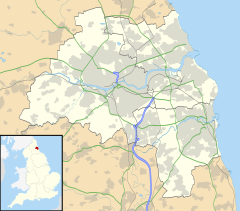Southwick is a former village and now a suburb on the north banks of the River Wear in Sunderland, in the county of Tyne and Wear, England, historically in County Durham. From 1894 to 1928, Southwick was administered by the Southwick-on-Wear Urban District Council,[2] before being absorbed by Sunderland.
| Southwick | |
|---|---|
 Darwin Street | |
Location within Tyne and Wear | |
| Population | 10,535 (2011.Ward)[1] |
| Metropolitan borough | |
| Metropolitan county | |
| Region | |
| Country | England |
| Sovereign state | United Kingdom |
| Post town | SUNDERLAND |
| Postcode district | SR5 |
| Police | Northumbria |
| Fire | Tyne and Wear |
| Ambulance | North East |
| UK Parliament | |
Southwick borders with Castletown and Hylton Red House to the west, Monkwearmouth to the east, greenbelt farmland and the suburb of Carley Hill to the north, and the Wear to the south although the Queen Alexandra Bridge links Southwick to Pallion and central Sunderland.
It is home to a police station that services the north of Sunderland. There is a primary school, but no secondary school. Sunderland A.F.C.'s Stadium of Light is visible to the east on the Monkwearmouth side.
Southwick is centered on its village green, a commercial area containing three listed buildings; a World War II war memorial, The Tramcar Inn a public house built in 1906, and a memorial lamp-post built in 1912. [1]
According to Indices of Deprivation published by the Department of the Environment, Transport and the Regions in 2000, Southwick is the most deprived of the 25 wards in Sunderland, the fifth most deprived in Tyne and Wear, and the fifty-fifth in England. [2].
History
editQuarrying has taken place in the area for many centuries but it was not until the 17th century that large quarries were built and production substantially increased. Wagonways were built to transport limestone from the quarries.
1698 saw the establishment of glassmaking in Southwick with the opening of Suddick Glasshouse. This was followed by Wearmouth Crown Glassworks in 1786. Southwick Bottleworks was a significant employer from 1846 to 1917.
Although it is likely that shipbuilding had taken place earlier the first registered shipbuilder was Henry Debord who was in business from 1785 to 1797.[3] William Pickersgill & Sons Ltd opened a shipyard in Southwick in 1845. At the time of a company merger with Austin's in 1954 the yard was redeveloped at a cost of £3 million. It closed in 1988.[4]
Southwick was formerly a township and chapelry in the parish of Monk-Wearmouth,[5] in 1866 Southwick became a separate civil parish, on 1 April 1928 the parish was abolished and merged with Sunderland.[6] In 1921 the parish had a population of 14,641.[7] In 1974 it became part of the metropolitan district of Sunderland.
Etymology
editThe name Southwick was recorded in the early 12th century as Suthewick in the 16th century as Suddick. It appears to mean "south dwelling/specialised farm" and thus derived from Old English suþ ("south, southern") + wic ("dwelling, specialised farm").[8][9]
References
edit- ^ "Sunderland ward population 2011". Retrieved 22 July 2015.
- ^ "Relationships and changes Southwick on Wear UD through time". A Vision of Britain through Time. Retrieved 6 September 2024.
- ^ "History – not such a thing of the past - Sunderland Echo". Archived from the original on 3 March 2016.
- ^ "William Pickersgill & Sons Ltd. - WRECK SITE". Archived from the original on 17 October 2011.
- ^ "History of Southwick on Wear, in Sunderland and County Durham". A Vision of Britain through Time. Retrieved 6 September 2024.
- ^ "Relationships and changes Southwick CP/Tn through time". A Vision of Britain through Time. Retrieved 6 September 2024.
- ^ "Population statistics Southwick CP/Tn through time". A Vision of Britain through Time. Retrieved 6 September 2024.
- ^ Mawer, Allen, The Place-Names of Northumberland and Durham (Cambridge: Cambridge University Press, 1920)
- ^ "Key to English Place Names - Southwick, Durham". The University of Nottingham. Retrieved 8 February 2024.
